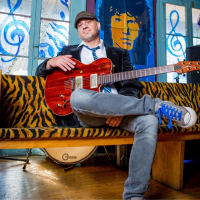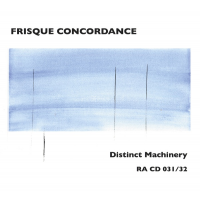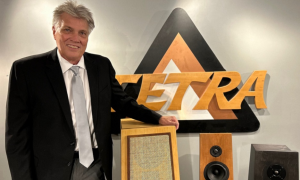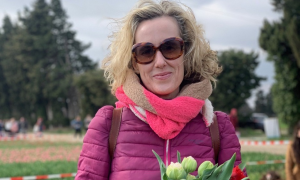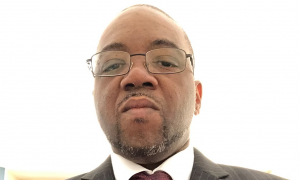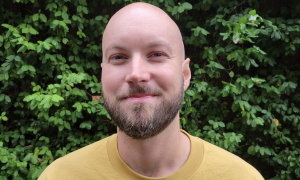Home » Jazz Articles » Chats with Cats » The Music Library Producer: Gene Ort
The Music Library Producer: Gene Ort
I would say to any musician that would listen to me, stop living in the virtual world and build relationships
—Gene Ort
I soon realized that I didn't have to do much other than wait and hope to be lucky enough that some music supervisors might choose my tunes out of thousands of others. But, after some time, I indeed starting getting checks and my BMI statements showed that my music was being placed in hundreds of shows around the globe. I had some really cool placements that looked great on my bio and even better in my bank account. It certainly helped make back the money I had invested into my recordings. I talked a little bit about this in one of my Mind Your Business articles.
One of the libraries that I had sent my music to over the years is GMP Music owned by Gene Ort. While I knew he was worldwide and was very successful, I didn't realize the full scope of what he has done and the effect he has had on the industry. In our conversation he told me how he initially stumbled into the business as well as the secrets to his success.
About Gene Ort
Gene Ort is a composer and producer who owns GMP Music, a music production library based out of Niles Michigan. His company was started in 1989 and currently has over forty-five thousand pieces of music and sound in its library. He's contributed audio to everything from blockbuster films and network television shows to radio, corporate films, websites and anything in between.As a child he was trained in classical music and is also a live sound and recording engineer as well as a videographer. Besides continuing to write and produce music he likes to play Pickleball, cycle, hike, and travel.
All About Jazz: What exactly is your job title and how did you get into this business?
Gene Ort: Well, I own this company and that seems to be what most people hear but, if you want to know where the real progression is, I started playing classical music when I was six and played piano, mostly classical stuff, until I rebelled and started playing rock and roll. But I played in the orchestra at school, and played in the marching band, and at twelve or thirteen I was in my first garage band. I played in variations of that all the way through my teen years and early adult years, and then in some hippie church in the early '70s. So I started doing rock in churches instead; very hippie-oriented stuff originally. So, like, my musical styles were all over the place. I played classical and did try my hand at jazz a little bit but not the straight-ahead stuff, more of the smooth stuff. I was a big fan of the The Rippingtons and that sort of thing. So I always had a real strong appreciation for it and knew, secretly, that those were the real musicians [laughs]. I never could get myself into atonal stuff. I recorded a lot of it back in the day but it was never my first thing.
I knew from a very young age that I needed to be where the sound was better than in any other place. I was one of those kids that from the first job I got I saved every dime I had and bought the most expensive stereo I could put my hands on. Then the very next thing I bought, I'm probably still twelve or thirteen years old, was an open reel machine so that I could record. I just knew that I wanted to be where the sound was better than anything. I was in a fairly successful Christian rock band in the late '70s, early '80s, and we did an album, were on TV, and got air time, that kind of stuff. It would have been classified as Folk Rock, real tight three-part harmony, and I was the keyboard player and one of the composers. That was probably the most early successful stuff that we did. Once I landed in a real recording studio I was in heaven. I said, "okay, this is what I've been dreaming of since I was ten," and I just knew instantly that that's where I had to be.
I was never formally trained but I ate everything up I could get my hands on in the way of reading and studying everything from acoustic design to electronics so I could fix my own stuff. I started building studios around here and there, in my house, in a building. Anywhere I could I would build a studio. I started with two tracks, and got four, and then eight, and then twelve, then twenty four, then tape machines, the whole bit.
So I had this studio and I had to become a piano tuner because we were doing these weekend tours, like three to four state areas. I bought a Yamaha grand piano and the guys in the band said, "hey, we got to pay somebody to tune this thing. We tune our instruments, you tune yours" [laughs]. So I picked up a book which is what I always did. By the way, you should know that I've been independent on my own since I was fifteen.
AAJ: independent, meaning living on your own?
GO: Yup. I was somewhat abandoned. I was your typical hippie. I looked like one of the guys from Crosby Stills & Nash.
So, I had to learn how to tune the piano. We were gigging a lot. But once I figured out how to tune pianos I found out that I could make money doing it and it took off. I have some kind of bizarre entrepreneurial bent because, before I knew what happened, I had nine employees and rented a building with a spray booth, an action rebuilding station, and a woodworking area. We would get these pianos and restore them for people and we started having people ship them to us from all over the place. I turned it into a business and, at the same time, I was building a small studio on the side. I was recording local bands, things like that. I lived really close to Notre Dame and I started doing remote recordings there. I got to be pretty well-known and started mixing "front of house" for local concerts. There were a couple television stations that heard about me and I started doing engineering when they would get anything more than two mics, basically. So I made a lot of friends in the broadcast television area, broadcast radio, and any other collegiate programs that had anything to do with music. I had good connections with all of those people.
So, my little studio business on the side was doing pretty good and I met a guy that altered the course of my life. He was a professor of botany and he was continuously doing these videos that they used at the university but he was really bad at audio. I had already learned how to do dialogue replacement and he would bring me these videos. Sometimes I would have to completely rebuild the audio for these videos, they call it "sweetening." Then, somebody contacted me and said, "hey, we need some music for a fundraiser." They asked me to write music for this multimedia fundraiser presentation. It was a big deal. I said "okay, I'll do that." So, I wrote about a dozen pieces of music for it, recorded it, and worked closely with the videographer/producer of it. That was really successful and everything got done. I was in my studio working for this botanist and, when the guy walked in, one of my cues was playing in the studio. He said, "what's that?" I said, "that's just some stuff I did for that fundraiser." He says, "what are you doing with it?" I said, "it's all done now." He said, "well, what are you doing with it now?" I said, "it's all done. There's nothing else to do with it," and he said, "no, you're wrong." He said, "I've been buying music from the back of this magazine from Oregon. I pay fifty bucks and I get this cassette of music that I can use in my video." I said, "huh, so you can sell this stuff?" He said, "yea." So I said, "fax me over that ad. I want to see it."
So he faxed me over the ad. I looked at it and said, "what the heck?" I found out what the magazine was, it was called Video Systems Magazine published by Knowledge Industries. Of course, I got the magazine, looked at it, and said, "holy crap, there's a whole thing here. There's a whole industry here and I've never heard of it." So, just for kicks and giggles, I took the twelve songs that I had written for that first fundraiser, threw them on a cassette, hand labeled them, and sent them to four or five of my friends in the broadcast industry that I had worked with. In two day's time I got a call from one of them. The guy's name is Larry. He says, "Let's do lunch. I need to talk with you."
So, I went and had lunch with him and he said, "I'd like to be your partner." I said, "what's this about?" He said, "you know, I've been getting music pitched to me from these things called music libraries forever and that stuff you sent me is twice as good as any of that stuff." I said, "well, I'll tell you what Larry, I don't want a partner but I will let you be an investor. You can invest in this first product." So Larry helps me launch this first product because he had more money than I did. I bought into a mailing list, I produced a postcard with some cool art on it, and I produced one volume, AV101. That had twelve songs on it from that fundraiser and it launched. I started getting calls and, within a short time, I outgrew the home studio. I had to get offices, and employees, and eventually ended up with three acres, about fifteen employees, and a great big studio I built from scratch.
That was the catalyst of it. I did the first volume and it did so well that it blew my mind. Then I produced three more fairly quickly and I started getting approached, even at that time, by much bigger companies trying to acquire me but I am a fiercely independent person, sometimes to my detriment. I still absolutely love the adaptive nature of staying alive when everything is changing. So that thing that scares the crap out of most people is the thing where creativity comes into play. Ok, here's the new situation and now I have to adapt. I have good adaptation skills.
AAJ: Can you tell me how things have changed since you started in the business?
GO: Well, I love technology and I was always a pretty good adapter going all the way back to when I was a kid. One of the things that I found out very early is that, no matter what the investment is, if you can find a way to to get the absolute best equipment and best resources, that's where you go. I was the first person in this area to have a Kurzweil. It was $12,000 back when $12,000 was $50,000.
So I would do just whatever I had to do to have the absolute best tools. I would find out where everybody else was afraid to go and I would go there. So the reason my productions, early on, sounded so much better than all the other ones is because they weren't going to spend that kind of money trying to win. I'm like, "that's exactly what you do." You go to the extreme on high-end. Quality is going to survive. That's what I found. Quality will survive. Be in a hurry and do cheap work and you're temporary. I find people in their genre who are very good at what they do. For my own material, I am not the best musician in the world. I'm far from the worst, but I work with people who are ten times better than me every single day.
AAJ: So, do you still write and record music yourself?
GO: Yup, every day. There is never a time when I'm not in production. I'm pretty diverse so I can write in just about every genre.
AAJ: I want you to tell me about the process of getting music to a client. Obviously, you write and produce music and you also have a vast library with other people's music. So what's that process?
GO: Well, in the original days we advertised in twenty different magazines. I did trade shows in Los Angeles, Las Vegas, New York, and in various spots around the country. The videographers, broadcasters, television producers, and film producers would go to those shows and you'd make relationships. Or, you would do direct mail advertising to get to them and you would send them a sample of your catalog.
The thing that put me on the map was when I looked at the methodology of the industry. This was right at the beginning with my first product. As I learned about my competitors they had the most bizarre method of sales that I'd ever heard of. You would get a recording with little sample pieces in different genres. Then you would have to buy the music library based on those samples. Not on what you would actually be using but based on those samples. I heard that and I was like, "that's ridiculous." Nobody wants to buy into something that they don't even know what it really is, that's crazy. So, I created this thing right away and called it the "no risk preview" and I advertised that like there was no tomorrow. I told producers of all kinds, it didn't matter who they were, I'll send you a CD (this was right at the beginning of CD production), if you like it buy it. If you don't like it,send it back. They said, "well, nobody's doing that." I said "I am" so they said, "send it to me." I will never forget being in Las Vegas the first time at one of the Production Music Library Association meetings. I walked into the room and, I swear, they wanted to piss on me and spit on me. They were cussing at me. They said, "you're a prostitute. You're sending out your music, and you don't make them buy it in advance, and you're wrecking the whole industry for us." That's the way it always works when you change a paradigm, someone's gonna love it and someone's gonna hate it.
AAJ: When somebody comes to you and says," I need a piece of music," how do you go about getting them that? Do you first try and make it on your own?
GO: Well, I've done everything, all of the above. In the old days they would say, "I need a piece of music" and I would go find it or make it for them. Custom music is not dead. I mean, it's still around but it's not quite the same. It'll never be that way again because of the ability to produce music on your laptop that's really good. If you have a good mic, a good preamp, and a good room, you can make pretty good music. You don't have to have giant rooms anymore and all that heavy technology.
What it used to be like was someone would say, "hey, I need a piece of music with this and that" so you'd frame it out and give them a sketch. They'd say, "yeah that works," Then you'd finish it and they'd pay you. Now, ninety percent of it is done online. A lot of times, for me, it's teaching my clients how to use the database. So I do a lot of video tutorials for clients depending upon what they're doing. I teach them how to use the tools so that they can find it themselves. I have forty-five thousand pieces of music in my library. And, I'm small compared to APM and Universal.
AAJ: So you're saying that, at this point, you're giving them the tools to search your library themselves?
GO: Well, sometimes they won't. So I'll get an email saying they need a piece of music for something and I can do it so fast now. I had entire sales teams back in that day and I would teach them, "The client is going to call you on the phone and ask for yellow music with blue trim and pink sparkles." I said that your job is to interpret what they're asking for. They're not experienced enough to say, "I need Nepalese folk music." We actually have that. I had to hire people that were very musically knowledgeable. They weren't just doing sales, per se, they were doing a light version of music supervision. But I had to learn that myself before I could teach it. I got pretty good at interpreting what people were asking for. I still have people calling up, "I need music for horseshoeing" and I actually know what I would send them because of forty years of experience.
Part of my job now is asking composers, "what are you doing that you like to do and that you think, like, you do the best at this?" I have that conversation with composers continuously. I have a very large stable of people that want to write for me. So, then they have to be proficient at the genre that they represent. I'm in a fortunate position to be able to say, "if you can clang two pieces of metal together artfully, I can probably sell it."
AAJ: Since your library is so vast, is there still music that you don't have? And, if there is, when do you make it yourself and when do you farm it out?
GO: Well, in the sense that music is always a moving target, it's shifting all the time and It's more subtle than dramatic. I don't think there's anything dramatically new going on like, "wow, I've never heard that before." But, there are combinations of things that truly Innovative composers will find. So I actually have guys that are on the other end of that and I can sort of tell when I need to take a break from them. They've stopped thinking about it and are just going through the motions and cranking stuff out. I still think there is art that can be made in a three-chord rock song. I think you can make a three-chord rock song interesting if you want to. But I can tell when they've given up on the creative thing and they're just trying to get past it. I've been told I'm unusual in that I'm never okay with that with myself. I keep pressing. I buy the best samples I can possibly get, I use only the best stuff. As soon as something else comes out I go buy it immediately.
This is something I'm so passionate about, it's crazy. More than ever before I want to become absolutely known for, not the most, but progressively better than even some of the big ones. I am constantly listening to my biggest competitors, the world leaders in production music. When we got music into the entire series of The Avengers and Disney, that is what I was shooting for.
AAJ: Well, that actually leads me to my next question which is for you to tell me about some of your biggest successes and some placements that you are the most proud of.
GO: Well, Disney is probably the one I'm most proud of. We had sound design and music in all of The Avengers movie trailers. Trailer music was a big deal for us. We had music in No Country for Old Men which was the Best Picture in 2007. We've got music in a ton of CBS shows, Amazing Race, NCIS, and crime dramas, and adventure stuff. There have been lots of TV shows, lots of movies, and documentaries. It's all over the map. But, a lot of our stuff just ends up in the day-to-day. It's fun to talk about the cool stuff but the day-to-day stuff is really helpful too.
One of the things that we have an endless need for is the stuff that is very positive and very uplifting for people that are trying to do something. I don't like just doing one thing. I work with a lot of composers from L.A. and they'll get orders for a huge number of background tracks, drama crime show stuff. I'll be honest, I don't really want to do twenty seven cues. I mean, I'm glad when the royalty checks come in, that part's good. But it's not what satisfies me as a musician. I'm still chasing that.
AAJ: So being creative is still part of your calculations?
GO: Oh, it's on the front burner for me. I want the next piece of music to be the best thing I've ever written.
AAJ: I know you're not a jazz musician but, I'm sure, you've placed a lot of jazz music. Could you tell me something about any of the peculiarities of placing that music?
GO: Jazz does get used. It doesn't get used in the same way that rock gets used. It doesn't get used the same way that orchestral scoring gets used. But it's very important, It's a unique part of the musical landscape for the whole world. In some ways because jazz is so identifiable to specific things. Like I said, I really do believe that jazz musicians are some of the best musicians in the world, period. I think sometimes it's a little too sophisticated for the average pallet. That's probably why it's not what we do the most. The average pallet doesn't identify with it that well.
I'll put it this way, there's always room for good jazz in my library, always. Especially when I hear something that's been recorded well, it's played well, and thought well. I always like having period jazz around, particularly. I just love that. Because I'm the guy who does the weird independent thing, I'll release it where a lot of my competition won't have anything to do with it because It's not going to be top ten. I'm like, "oh no, I want the fringe stuff."
If somebody approached me with some very unique jazz I would be thrilled because I don't care that it's not going to be the next big thing. I think it's fun and I like being diverse. I can't spend a tremendous amount of time chasing the niche but, luckily, with the internet most of the people that are interested in this kind of thing find me. If it can be artfully done, someone is going to want it. For me, I then become a curator more than anything else.
AAJ: What are some of the common uses of jazz?
GO: If you're doing a TV show in, like, New York City. Jazz is very alive in metropolitan areas but probably not so much in the Midwest or in the middle of farm country. But, if you're doing a program in an urban environment whether it's a TV show, or a movie, or anything like that, on that kind of production level, there's reasons to have it because the producers want authenticity. For me, it really is just about building a vast collection of really good, unique, specific things that are going to be usable for somebody at some point in time.
I don't know exactly what time this was in the history of my company but I had produced some pretty big orchestral stuff and it was four years after I produced it that I got this really big BMI check. I'm like, "what the heck?" I looked at it and Disney had used a piece that I wrote and produced on a national release of Alice in Wonderland on DVD. The ads ran on every network for three weeks, primetime. It was like, "hello!" That music had been in there for four years waiting for the right time and the right place.
I've been doing this for long enough that I have relationships with the networks, and I have relationships with production companies, and trailer houses, and stuff all over the world. We have distribution everywhere. I have a distributor in China, in Japan, in France, in Israel, in Germany... So it's not just me and my website here. And everything I produce here goes into a vault at CBS where they pull from. But that takes a long time to build those kinds of relationships.
AAJ: Yes, because you have been doing this before people could just go on the internet. Back in the day, I'm sure you had to speak to somebody, right?
GO: Yeah, it's very true. That's why I said I had a room with sales people, actual human beings answering the phones and talking to people. If somebody says they're looking for this we would go and pull a case of CDs and they would have that for two to three months. We'd say, "hey, did you find anything in there you want?" and they'd say, "yeah, we picked out this and will go ahead and send it back with a check." I literally had a full-time person who was doing nothing more than taking CDs out of boxes, cleaning them up, and putting them back on the shelf. Then I had to rent a warehouse where I had over a hundred thousand CDs on shelves. Yeah, that was nuts.
AAJ: Is there something you can offer in the way of advice to musicians who are looking to get their music placed?
GO: I would say don't be afraid to try things. My mind is that whatever I created today was today's creation. Go let it do something. Tomorrow I'll go make something else. So I would tell people to create your best work every single day and try to find as many places as you can to send it, with intelligence.
I've had to back away from a lot of the non-exclusive stuff because the world has changed. So try and build a relationship with somebody that is very reputable and that you can have conversations with. Not some of these sites where you just upload your crap and hope something happens. That will get you a few bucks here or there but, in the end, it's not going to build the relationships that are going to take you to the next level and build longevity.
If I didn't own my own library I would contact the biggest library there was and say, "what do I need to get in this door?" I remember when I wanted in to the trailer business. I was working for a company that was in New York City. It was a big trailer house, famous. I was talking to the gal and asked her, "you've been working with me for years now but yet you never really done anything with me. What do I need to do to open this door?" I was real honest and frank. She said, "you need to be here." I said, "you mean I need to move?" She said, "no no no. You just need to come and visit and let us get to know you."
I'd already been in business a long time and I thought, you never can get past that. I would say to any musician that would listen to me, stop living in the virtual world and build relationships. So I did. I arranged it for a month or two later. I told her I'm coming to New York and she said, "great, let's do it."
So I went to New York, they had sixteen edit suites and were working on The Bourne Identity, Pirates of the Caribbean, major film releases and I met every single editor. I shook their hand, sat with them, got to know them, asked them what they would like, how I could help them, what they needed and how I could be the one who gets it to them. I wrote so much custom music after that, oh my god. That's how I got sound in No Country for Old Men.. How does that happen? Well, I got off my butt and spent money and then went out to dinner, bought everybody dinner of course. I spent a lot of money, went out for drinks, laughed, had fun and built relationships. To this day I'm still friends with those people. And a lot of those people have left that company and are working for other trailer houses out west now. So you have to hone your craft and everything else but, past that, it has to become intelligent relationships. In the end, I think it wins. I like to deal with real human beings. I don't get to meet all of my composers, obviously, but you can build a really good relationship over the phone and through Zoom and everything else. The guys that I work with the most, know that I want their best work. Send me your best and then I'm going to keep coming back. Let's do something fun together.
Today's creativity really is something to grab a hold of him and then let go of. I did this today. Alright, that's today. Put it out there and let it do whatever it's going to do and go back tomorrow. The best songwriters, I've been told, write every single day.
AAJ: What do you foresee as the future of your business? Will it change?
GO: Guaranteed. I think there's two paths and there always have been. Quality will rise. So the music part of it will always do the same thing. There's going to be people who are mad because technology has replaced the organicness of music and they'll rebel against that. Then there will be people that will embrace that and say, "okay, I'm going to make the best darn hybrid thing I can possibly make and be as interesting as I possibly can be."
Then, there'll be other people that are going to say, "I'm going to write two thousand songs this year and flood the buyout market with that stuff." They'll do something too. There's a place for that. But, I think quality that is going to adapt to the current circumstances always wins. I don't think a lot is going to change with the technology of delivery. I think the internet has done what it's going to do and it will just get a little faster. But here's the good news, media ain't going anywhere: Instagram; Facebook; TikTok; all these social platforms. YouTube is only going to get bigger. There may be a new social platform but it's going to be the old thing dressed up in a new skirt. So none of that's going away. The amount of music needed for media is not going to go down. I think that the only way to make it out of the bargain bin is to be better.
Part of my skill set had to go into running a business. I could have been a better musician than I am but I would not have been able to be a businessman. I've had to make some choices and, if you're a jazz musician, you've chosen a very strong artistic expression of music.
I watched some documentary not too long ago about Louis Armstrong and his career. Good grief was that complicated. His life and what he had to do to rise to the level that he rose to. It's astronomical. So if you're going to do that you have to be really really good and learn how to market yourself I guess.
The first big studio I recorded at I saw a sign up on the wall that said, "A funny thing happens when you don't promote. NOTHING." That was forty years ago and I still remember it. How do you define your success? I used to be written up in magazines all the time. I'm like, I looked around and saw something that needed to be done and I did it. I took some college courses but I don't have a degree in anything. I am a voracious reader and have taught myself everything that I needed.
AAJ: Well, congratulations on your success. It's very impressive. I'm going to circle back to my first question and then I'm done. I asked you what your job title was. I know you wear many hats but can you narrow it down to a specific job or jobs?
GO: I've had this discussion hundreds upon hundreds of times where people have asked me that same question. I own a company but on my signature, you know when I send out an email, I couldn't give one title so I had to give two—Owner, Producer. I am a producer in the quintessential meaning of that. Music that doesn't exist, when I'm done it does exist and that's the thing that drove everything. I would not be an owner had I not been a producer. That came first.
I have a good good friend of mine, a first-call, top-row session trumpet player. He summarized it one time and said, "you're nothing more than a noisemaker. I make noise with my lips, you make noise with your fingers." We're just noisemakers. There was a wonderful humility that I found in that, a "glorified noisemaker." And if you put the right noises in the right order, in the right way, somebody wants to hear it. I tell people all the time, I am unimaginably fortunate to be able to do what I do for my whole life. I couldn't be more grateful if I tried.
Tags
PREVIOUS / NEXT
Support All About Jazz
 All About Jazz has been a pillar of jazz since 1995, championing it as an art form and, more importantly, supporting the musicians who make it. Our enduring commitment has made "AAJ" one of the most culturally important websites of its kind, read by hundreds of thousands of fans, musicians and industry figures every month.
All About Jazz has been a pillar of jazz since 1995, championing it as an art form and, more importantly, supporting the musicians who make it. Our enduring commitment has made "AAJ" one of the most culturally important websites of its kind, read by hundreds of thousands of fans, musicians and industry figures every month.

